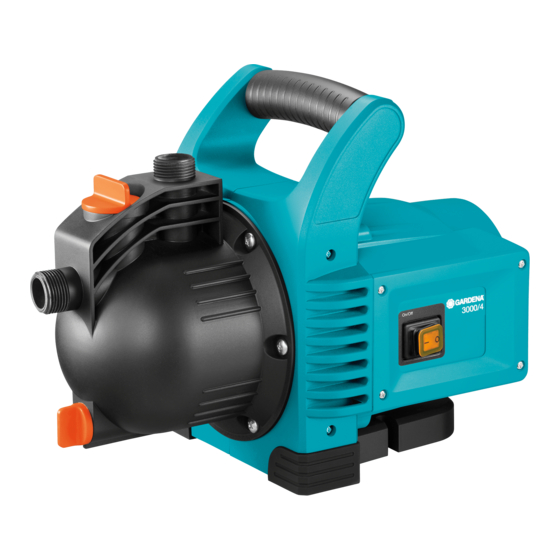Note
v Protect the pump from rain. Don't use the
pump in wet or moist area.
In order to avoid dry-running of the pump, take
care that the end of the suction hose is always
submerged into the liquid.
v Before each operation, fill the pump to over-
flowing with approx. 2 to 3 l of the liquid to be
pumped!
3. Initial Operation
Setting up your Garden Pump:
Connecting hose to
suction side:
2
1
Sand and other abrasive substances in the liquid
cause in-creased wear and reduce the pump's
output.
Pumping dirty water, e.g. stones, pine needles
etc., can cause damage to the pump.
v Do not pump dirty water.
The minimum flow rate is: 4000/5: 90 l/h
(= 1.5 l/min); 5000/5: 200 l/h (= 3.3 l/min).
Watering accessories with lower rate must not
be operated.
The site must be firm and solid in order to ensure safe and sturdy
operating conditions for the pump.
v Position the pump at a safe distance (min. 2 m) from the liquid
to be pumped.
The pump must be installed in a location with low air humidity
and sufficient ventilation in the area of the ventilation slots.
It must be at a distance of at least 5 cm from the walls.
No dirtcontamination (e.g. sand or earth) may be sucked in
through theventilation slots.
Don't use any hose connection system fittings on the
suction side! A vacuum-resistant suction hose must be used,
e. g. GARDENA Suction Unit, art. no. 1411.
In order to reduce the suction time, it is advisable to use a suction
hose with backflow preventer avoiding automatic draining of the
suction hose when the pump is stopped.
1. Screw a vacuum-resistant suction hose
connector on the suction side of the pump
2. For suction heights exceeding 4 m also secure the suction
hose
(e.g. by fastening it to a wooden post).
1
This relieves the pump of the weight of the suction hose.
airtight onto the
1
.
2
15

